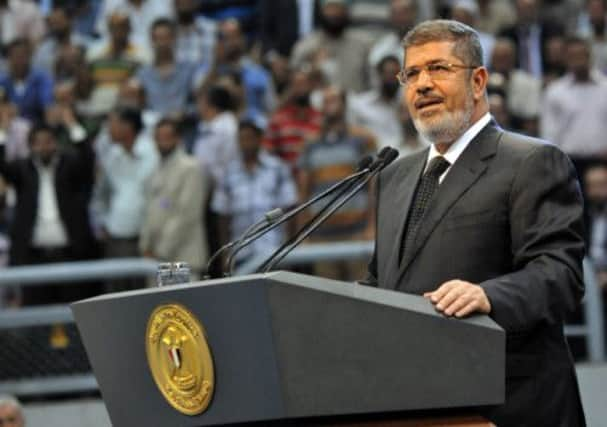New Luxor governor has links to 1997 temple massacre


Adel Mohamed al-Khayat – who now represents the Building and Development Party, the political wing of the once violent al-Gamaa al-Islamiya (AGAI) movement – was one of 17 new governors, several of them Islamists, who took their oaths yesterday with the president.
But his appointment stirred outrage in some quarters.
“No to the terrorist governor!” read one placard at a demonstration by dozens of tourism workers who protested outside the governor’s office in Luxor.
Advertisement
Hide AdAdvertisement
Hide AdMr Khayat, then in his mid-40s, was a leader of AGAI in another province when, on 17 November, 1997, six young men from the group shot their way into the Temple of Hatshepsut in Luxor’s Valley of the Queens.
The attack was part of a broader campaign by the group, at that time linked to al-Qaeda, to cripple tourism revenues for the government of then president Hosni Mubarak. Of the 62 people killed in the next hour, 58 were foreign tourists. More than half were Swiss, the rest were Japanese, British, German and Colombian. The gunmen, reported to have trained at al-Qaeda camps in Afghanistan, then killed themselves.
AGAI – also implicated in the 1981 assassination of Mubarak’s predecessor, Anwar Sadat – renounced violence and condemned al-Qaeda in ideological U-turns a decade ago. The group moved into public life after the revolution in 2011 which ended Mubarak’s military-backed rule.
Mr Morsi, from the Islamist Muslim Brotherhood, has called for the United States to free the group’s spiritual leader, Omar Abdel Rahman, who was jailed for life in connection with a bid to blow up New York’s World Trade Centre in 1993.
In Luxor, where tourism dropped off sharply after the 1997 attack and has been hit again by the unrest before and since Mubarak’s fall, some protesters expressed concern that radical Islam could cause even further damage to the region.
Mr Khayat was quoted in one Egyptian newspaper yesterday as saying he would welcome “all forms of tourism”.
But his party has called for a ban on alcohol and nightclubs and wants visitors to not wear skimpy clothing.
“Doesn’t the president know that the people of Luxor depend on tourism for their livelihoods?” said one of the demonstrators, Abubaker Fadel.
Advertisement
Hide AdAdvertisement
Hide AdHistorian Khaled Fahmy, from the American University in Cairo, said the appointment was the latest proof of a “short-sighted approach” by Mr Morsi and his Muslim Brotherhood, a major Islamist movement that foreswore violence in the 1970s.
“It’s as if the Muslim Brotherhood is reaching out to the extremists,” Mr Fahmy said.
Mr Morsi’s supporters defended the choice of Mr Khayat, saying AGAI had been successful in cracking down on crime in the south, where it is well established in the local tribal system.
Mostafa Elgheinemy of the Muslim Brotherhood’s executive said: “It is impossible to exclude a faction, even if its history is bad, as long as they have rid themselves of these ideas.”
The appointments mean the Brotherhood controls the governorships in ten out of the country’s 27 provinces, allowing it to further consolidate power.